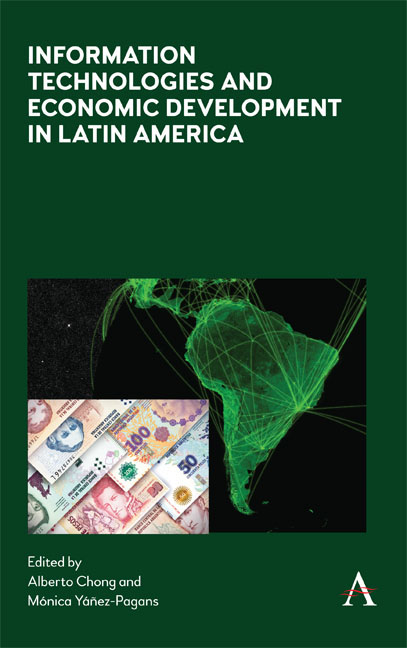Book contents
- Frontmatter
- Contents
- List of Illustrations
- List of Editors
- List of Contributors
- Acknowledgments
- Chapter 1 Information Technologies in Latin America
- Chapter 2 The Impact of ICT in Health Promotion: A Randomized Experiment with Diabetic Patients
- Chapter 3 The Impact of ICT on Adolescents’ Perceptions and Consumption of Substances: Evidence from a Randomized Trial in Uruguay
- Chapter 4 Text Messages as Social Policy Instrument: Evidence from a Randomized Controlled Trial with Internal Refugees in Colombia
- Chapter 5 Radio and Video as a Means for Financial Education in Rural Households in Peru
- Chapter 6 Digital Labor-Market Intermediation and Subjective Job Expectations
- Chapter 7 From Cow Sellers to Beef Exporters: The Impact of Traceability on Cattle Farmers
- Chapter 8 The Labor Market Return to ICT Skills: A Field Experiment
- Chapter 9 Soap Operas for Female Micro Entrepreneur Training
- Index
Chapter 4 - Text Messages as Social Policy Instrument: Evidence from a Randomized Controlled Trial with Internal Refugees in Colombia
Published online by Cambridge University Press: 30 April 2020
- Frontmatter
- Contents
- List of Illustrations
- List of Editors
- List of Contributors
- Acknowledgments
- Chapter 1 Information Technologies in Latin America
- Chapter 2 The Impact of ICT in Health Promotion: A Randomized Experiment with Diabetic Patients
- Chapter 3 The Impact of ICT on Adolescents’ Perceptions and Consumption of Substances: Evidence from a Randomized Trial in Uruguay
- Chapter 4 Text Messages as Social Policy Instrument: Evidence from a Randomized Controlled Trial with Internal Refugees in Colombia
- Chapter 5 Radio and Video as a Means for Financial Education in Rural Households in Peru
- Chapter 6 Digital Labor-Market Intermediation and Subjective Job Expectations
- Chapter 7 From Cow Sellers to Beef Exporters: The Impact of Traceability on Cattle Farmers
- Chapter 8 The Labor Market Return to ICT Skills: A Field Experiment
- Chapter 9 Soap Operas for Female Micro Entrepreneur Training
- Index
Summary
Introduction
Like other Latin American countries, Colombia witnessed the rise of guerrilla movements in the 1960s and 1970s. However, unlike the rest of the region, armed opposition is still active to date and it is largely represented by the Revolutionary Armed Forces of Colombia (hereafter FARC from its acronym in Spanish). In addition to the guerillas the conflict features another illegal armed group since the early 1980s— the paramilitary forces. These rightwing militias were originally formed by local elites, landowners and drug lords to counteract guerrilla extortion and ransom tactics of the guerrillas. The Colombian conflict has been especially harmful for the civilian population. Both guerrillas and paramilitaries have specialized in victimizing civilians which includes the forced displacement of a large share of the population (Vargas, 2016). In fact, violence-driven internal migration has become the most dramatic social consequence of the conflict, affecting up to 90 percent of the country's municipalities. Many municipalities that receive internally displaced people (IDP) lack the capacity to handle the inflow of refugees. Moreover, 98 percent of displaced households live below the poverty line and face unemployment rates much higher than the rest of the population (Ibanez and Moya, 2010). IDP are among the most vulnerable populations in Colombia. For this reason, the United Nations classified this situation as “the biggest humanitarian crisis in Western Hemisphere” (UN, 2004).
According to Acción Social, Colombia's governmental agency in charge of social policy and humanitarian aid, by the end of 2009 approximately 3.5 million people had been forcibly displaced from their homes. This represents almost 9 percent of the nation's total population and roughly 8 percent of all IDP worldwide. According to statistics from the UN High Commissioner for Refugees (UNHCR, 2009), Colombia is one of the countries with the highest numbers of IDP worldwide, together with Iraq and Sudan.
Land disputes are the main driver of forced displacement: up to 4 million acres of land have been abandoned by the original owners. Colombia has today the most unequal land distribution of Latin America (Ibanez, 2009). The illegal expropriation of large amounts of acreage is also attributed to the need for arable land for the cultivation of coca, the main element used in the production of cocaine. Estimates show that Colombia exports approximately 70 percent of the world's supply (Mejia and Restrepo, 2010).
- Type
- Chapter
- Information
- Publisher: Anthem PressPrint publication year: 2020



